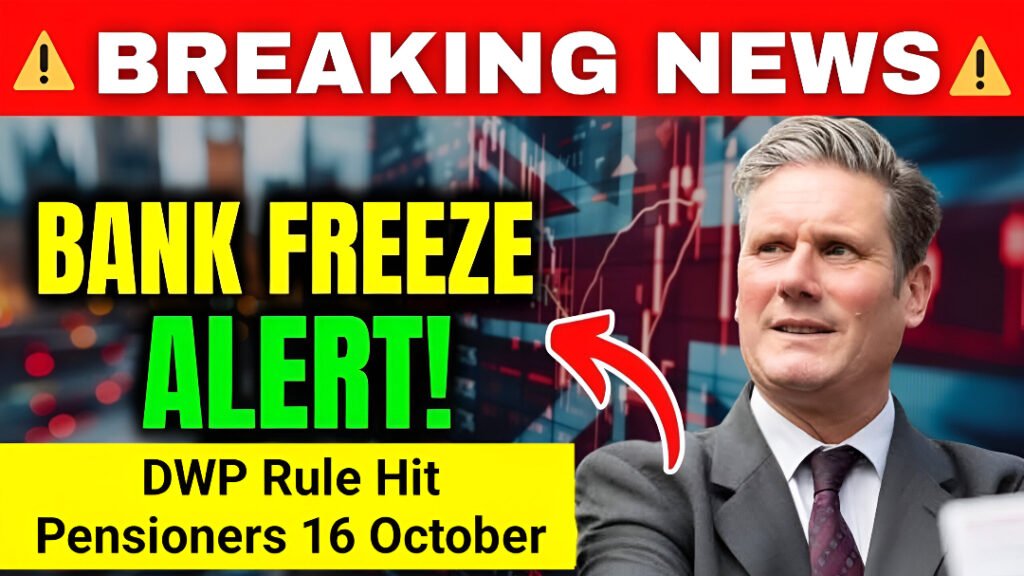Hello Everyone, The Department for Work and Pensions (DWP) has issued an important warning for UK pensioners about new strict bank monitoring rules coming into effect from 16 October 2025. These changes aim to tackle benefit fraud and ensure that pension payments are being used correctly, but many older citizens are being advised to review their finances carefully to avoid unnecessary issues.
Under the new system, DWP will have greater access to pensioners’ financial records and will work closely with UK banks to track unusual transactions that could indicate undeclared income or savings.
What Are the New Bank Rules?
From 16 October, DWP will start automatic data sharing with banks, meaning that certain account activities will be monitored digitally without needing direct approval from claimants. This includes accounts linked to:
-
State Pension and Pension Credit
-
Universal Credit (for those still eligible)
-
Housing Benefit and Disability Payments
The aim is to detect cases where pensioners may have undisclosed savings, foreign income, or inheritance that could affect their benefits. DWP officials say that the move will “protect taxpayers’ money” while ensuring fairness across the system.
Why the Change Is Being Introduced
The UK government estimates that billions of pounds are lost annually due to benefit overpayments and fraud. Much of this happens because of inaccurate or outdated financial information. By allowing banks to automatically share relevant financial data, DWP hopes to.
-
Reduce fraudulent claims and prevent misuse of public funds.
-
Ensure faster updates when someone’s financial situation changes.
-
Simplify the review process for legitimate claimants.
However, some campaigners warn that honest pensioners may face unnecessary stress if minor banking errors or one-off transactions trigger false alerts.
How DWP Will Access Pensioners’ Accounts
Under the Data Protection and Digital Information Bill, banks will be legally required to flag any financial behaviour that appears inconsistent with benefit eligibility rules. Examples include:
-
Sudden large deposits or withdrawals.
-
Regular overseas transfers.
-
New joint accounts or high-interest savings growth.
The DWP has clarified that they will not have full access to view all transactions instead, they’ll receive alerts when unusual financial activity l occurs. Only after review will a case officer request more details or conduct an investigation.
What Pensioners Should Do Now
With just days left before the rule changes, experts are advising pensioners to take proactive steps to avoid problems. Here’s what you can do.
-
Check your savings: Make sure all income and savings details are correctly declared to DWP.
-
Avoid large unexplained transfers that could appear suspicious.
-
Keep documentation for gifts, inheritance, or asset sales in case DWP requests proof.
-
Contact your bank or local benefits office if you are unsure about compliance.
Financial advisors also recommend reviewing your Pension Credit and State Pension statements to ensure all details match current circumstances.
Public Reaction and Concerns
While the DWP insists that these measures are targeted at reducing fraud, many pensioner advocacy groups are voicing concerns. They argue that automatic monitoring could invade privacy and cause confusion for older citizens who are not tech-savvy.
Consumer rights campaigner Helen Morgan from Age UK said, “The government must ensure that genuine pensioners aren’t punished for small mistakes or innocent transactions. Transparency and support will be key to making this system fair.”
Still, DWP maintains that pensioners who follow the rules and keep their records updated have nothing to worry about.
Key Benefits of the New Rules
Despite concerns, the DWP highlights several advantages of the new bank data-sharing system.
-
Faster fraud detection, reducing loss of public money.
-
Automatic updates to benefit calculations when finances change.
-
Reduced paperwork for claimants.
-
More accurate payments, preventing both overpayments and underpayments.
What Happens If DWP Flags Your Account?
If your account is flagged for review, DWP will contact you directly via official letter or phone call — never by email or text. They may ask you to provide evidence, such as bank statements or savings details.
Failing to respond could temporarily suspend benefit payments, so pensioners are urged to stay alert for genuine DWP communications.
To avoid scams, always verify that correspondence is from Department for Work and Pensions and not from third-party sources.
Impact on Overseas Pensioners
For UK pensioners living abroad or with foreign bank accounts, these rules may also apply. DWP has confirmed that data-sharing agreements will soon extend to major UK-linked banks operating overseas, particularly in Europe.
If you receive your pension abroad, make sure your bank details and residency status are fully updated to prevent payment delays.
Conclusion
The new DWP bank monitoring rules starting on 16 October 2025 represent one of the biggest reforms in recent years for pension security in the UK. While the goal is to reduce fraud and improve accuracy, it also puts greater responsibility on pensioners to keep their financial information transparent and current.
To stay protected, ensure all your savings, income, and bank details are accurately reported to the DWP. Honest claimants have little to fear — but awareness and preparation are key.
These rules mark a significant shift toward a more data-driven welfare system, one that aims to balance fairness, efficiency, and accountability for all UK pensioners.
